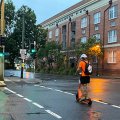University of Queensland scientists are testing the world's first DNA "fingerprint" test from single cells.
The test means DNA profiles or "fingerprints" will now be available from a far wider range of samples including dandruff, skin flakes, tongue cells on the backs of stamps or smudges on steering wheels and guns as well as samples up to 50 years old.
In collaboration with staff from the John Tonge Centre, Australian Genome Research Facility (AGRF) scientists are trialing the test on a range of forensic samples including blood and semen.
The AGRF, jointly run by UQ and the Walter and Eliza Hall Institute, is one of the research centres forming part of the University's new $105 million Institute for Molecular Bioscience due to be constructed at the St Lucia campus by 2002.
According to AGRF senior scientist Dr Ian Findlay, the test will also be able to differentiate between semen in a mixed sample such as that taken after a gang rape, information not available to police using current forensic techniques.
"The technology has not been available for testing insufficient or contaminated samples in the past. Using state-of-the-art PCR and DNA sequencing techniques, DNA information can now be obtained helping police with their inquiries," Dr Findlay said.
"Once available to the courts, the test may result in many unsolved criminal cases being re-opened and culprits brought to justice for crimes dating back many years."
While the diagnostic test was developed at the University of Leeds in the UK and published in the prestigious international journal Nature in 1997, the current testing at the University represents the first trials of the procedure.
Dr Findlay said he was attracted to move his research to the AGRF because of its superior molecular biology facilities, prestige and nearness to forensic facilities such as the John Tonge Centre.
"Leo Frewey and Pete Clausen from the Centre are providing me with DNA samples from existing cases and I am using the test to produce a DNA fingerprint. We are then comparing this result with the DNA information received from the old testing procedure," Dr Findlay said.
"In this way, we are confirming the reliability and accuracy of the test before it is made available to the police for use on unknown samples."
For more information, contact Dr Ian Findlay (telephone 07 3365 9118).
.jpg)


